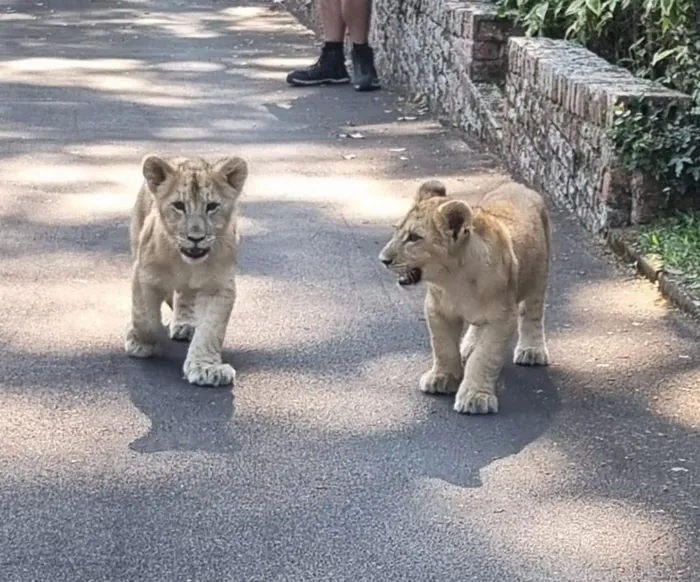Police open criminal case after two lion cubs kept without a permit in Westville

Two lion cubs were found at a property in the Dawncliffe area of Westville near Durban. Picture: Warren Schultz.
Police have opened a criminal case after two lion cubs were found without a permit inside a residential property in the Dawncliffe area of Westville on Tuesday.
Police spokesperson Colonel Robert Netshiunda said the case was opened under the National Environmental Management Act – undertaking a restricted activity involving a threatened/protected species without a permit.
Netshiunda said on Tuesday police from Westville SAPS were called to the property to back up the SPCA and wildlife conservation officials.
“The SPCA had received a call that there were cubs kept on the premises. On arrival they met with some resistance but police assisted in searching the property and the cubs were found. The information was positive and all role-players were summoned to the scene,” said Netshiunda, adding that no arrests had been made.
Ezemvelo KZN Wildlife spokesperson Musa Mntambo said the conservation body has not issued any permits for the lion cubs and is unaware of their origin.
“In terms of both the Natal Nature Conservation Ordinance, 15 of 1974, and the Threatened or Protected Species Regulations, promulgated in terms of the National Environment Management: Biodiversity Act, permits are required to keep a lion in captivity. This is irrespective of the locality, so yes, in the absence of a permit, laws have been broken,” he said.
Mntambo said Ezemvelo has adopted standards for the keeping of wild animals in captivity which set out the minimum enclosure requirements, environmental enrichment needs for such species and the purpose for keeping them.
“In light of such standards, keeping lion cubs in a residential area as pets would not be supported. Furthermore, municipal by-laws may also have been contravened,” he said.
He added that there has been considerable focus on the keeping of lions in captivity on a national level, which includes the phasing out of lions in captivity.
“Ezemvelo has provided considerable input into this process and as is evident by the limited number of lions in captivity in the province, does not support lions in captivity as pets, or for personal enjoyment.
“There are only two facilities in the province that house lions for educational purposes,” said Mntambo.
Kloof and Highway SPCA manager Barbara Patrick told “The Mercury“ the male and female cubs are doing well and are being safely kept and closely monitored.
“It’s the saddest thing. We believe wild animals should be in the wild. They are not pets,” she said.
A Westville resident, who requested not to be named, said he was at the property with two officers and two SPCA inspectors.
“As the cops arrived, a young woman pulled up and denied there were lion cubs on the property,” he said.
He said the police then asked for access and the woman refused.
“About 20 minutes later she allowed the two officers and one inspector onto the property,” he said, adding that there were no cubs found.
@themercurysa #lioncubs #westville #criminalcase #ezemvelokznwildlife #saps #fypsouthafrica ♬ Jungle-like ethnic BGM(1550722) - PUKASHELL MUSIC
However, the resident said pictures of the cubs in his possession proved that they were in the correct yard.
“She eventually said ‘Okay yes, we did have cubs here and they were taken away two days ago’,” he said.
He said moments later they were informed by the neighbour directly behind the property that there was something wrong in her yard.
“The two cubs were found in the garden.”
The domestic worker, who spotted the wild animals in her employer’s garden, said at first she thought they were dogs.
“I called my madam and told her. She called the security company to come and remove them.
“When they arrived they told me that they were not dogs but lions. I ran inside the house,” she said.
Dr Louise de Waal, director of Blood Lions, which runs a campaign to expose the exploitation of lions, said they are hugely concerned that two lion cubs were kept illegally at a residential property in Durban.
“Providing for the needs of predators in captivity is extremely difficult, and to do so at a residential property is impossible.
“It raises various welfare and safety concerns. These cubs will grow into dangerous predators quickly, posing potential danger for other residents, as already seen with several tiger escapes from residential properties in Gauteng,” she said.
The Mercury
Related Topics: